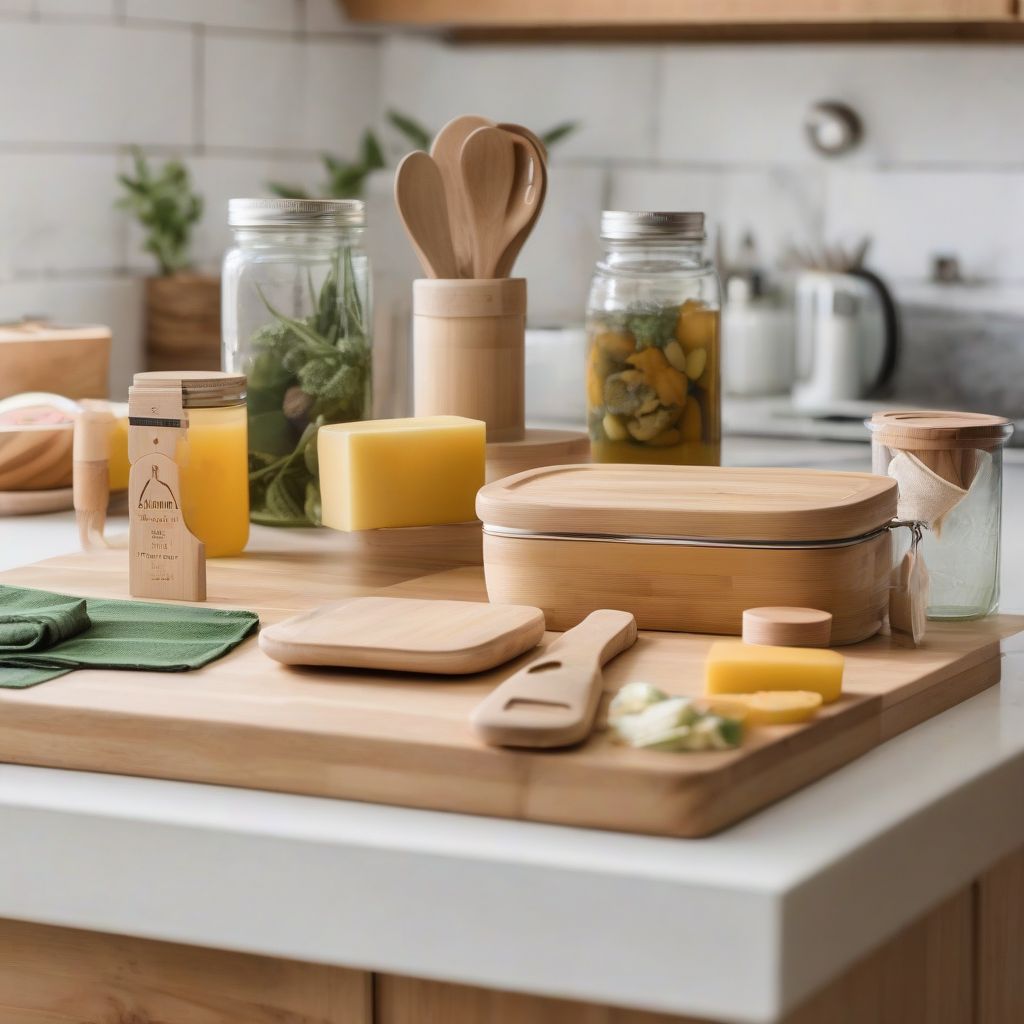Have you ever stopped to think about the environmental impact of your kitchen? It’s easy to overlook amidst the hustle and bustle of cooking, but our kitchens can be surprisingly resource-intensive. From the appliances we use to the food we store, every choice has an impact. The good news is that by making conscious decisions about the products we bring into our kitchens, we can significantly reduce our environmental footprint.
As a nutritionist and meal-prep coach, I’m passionate about both healthy eating and sustainable living. Over the past 8 years, I’ve helped countless people achieve their wellness goals, and I believe that a sustainable lifestyle goes hand-in-hand with a healthy one.
This guide will equip you with the knowledge to transform your kitchen into an eco-friendly haven. We’ll delve into the world of sustainable kitchen products, exploring the materials to look for, the certifications to trust, and how to make informed choices that align with your values.
Understanding the Importance of Eco-Friendly Kitchens
Before we dive into specifics, let’s take a moment to understand why eco-friendly kitchens matter. Our kitchens are often a hub of resource consumption, generating waste, consuming energy, and potentially contributing to deforestation and pollution.
Here’s why choosing eco-friendly kitchen products makes a difference:
- Reduced Plastic Waste: By opting for reusable, durable alternatives to single-use plastics, you actively contribute to reducing the overwhelming amount of plastic waste ending up in landfills and oceans.
- Conserving Resources: Sustainable materials are often made from renewable resources or recycled content, minimizing the demand for virgin materials and reducing the environmental burden of extraction and production.
- Promoting Ethical Practices: Choosing eco-friendly products often means supporting companies committed to fair labor practices, safe working conditions, and responsible sourcing of materials.
- Protecting Our Health: Many conventional kitchen products contain harmful chemicals that can leach into our food and air. Eco-friendly options often prioritize natural and non-toxic materials, safeguarding our health and well-being.
Key Materials to Look for in Eco-Friendly Kitchen Products
Navigating the world of eco-friendly materials can feel overwhelming with so many options available. Here’s a breakdown of some of the top contenders for sustainable kitchen products:
1. Bamboo: This fast-growing grass is a powerhouse of sustainability, known for its durability, renewability, and natural resistance to bacteria. Look for bamboo cutting boards, utensils, and even food storage containers.
2. Glass: An age-old material that remains a sustainable champion. Glass is endlessly recyclable, doesn’t leach harmful chemicals, and is perfect for food storage, baking dishes, and even reusable water bottles.
3. Stainless Steel: Durable, long-lasting, and fully recyclable, stainless steel is a wise choice for pots, pans, water bottles, and food storage containers. Look for food-grade stainless steel to ensure the highest quality and safety.
4. Silicone: This versatile material is heat-resistant, non-stick, and a great alternative to plastic wrap or single-use baking cups. Look for food-grade silicone to ensure it’s safe for contact with your food.
5. Beeswax Wraps: These natural wraps are made from cotton cloth infused with beeswax, a natural antibacterial. They’re perfect for wrapping sandwiches, snacks, or covering bowls, and they can be washed and reused for months.
 Eco-Friendly Kitchen Essentials
Eco-Friendly Kitchen Essentials
Certifications to Guide Your Choices
Eco-friendly certifications can help you quickly identify products that meet specific sustainability standards. Look for these certifications on packaging:
- Forest Stewardship Council (FSC): Ensures that wood and paper products come from responsibly managed forests.
- Fair Trade Certified: Supports fair wages and safe working conditions for farmers and workers.
- B Corporation (B Corp): Certifies companies that meet high standards of social and environmental performance.
- USDA Organic: Indicates that products meet strict standards for organic production, minimizing exposure to pesticides and synthetic fertilizers.
Eco-Friendly Swaps for a Sustainable Kitchen Makeover
Ready to green your kitchen? Here are some simple swaps you can make for a more sustainable cooking space:
- Ditch the Plastic Wrap: Replace plastic wrap with beeswax wraps, reusable silicone food covers, or simply use a plate to cover leftovers.
- Opt for Reusable Bags: Say goodbye to single-use plastic bags and embrace reusable bags made from cloth, canvas, or mesh for grocery shopping and food storage.
- Choose Sustainable Cleaning Supplies: Look for plant-based, biodegradable cleaning products in concentrated formulas to minimize packaging waste. Refillable cleaning supplies are also a great way to reduce your footprint.
- Embrace a Compost Bin: Composting food scraps is an excellent way to reduce landfill waste and create nutrient-rich soil for your garden.
Conclusion: Small Changes, Big Impact
Creating an eco-friendly kitchen doesn’t require a complete overhaul. By making conscious choices one step at a time, you can make a meaningful difference for the planet and your own well-being.
Remember, every small step counts, and together, our collective efforts can create a ripple effect towards a more sustainable future. So, start exploring eco-friendly alternatives, embrace reusable options, and let your kitchen be a reflection of your commitment to a healthier planet.
What are your favorite eco-friendly kitchen swaps? Share your tips and tricks in the comments below!
[amazon bestseller=”eco-friendly kitchen products”]
